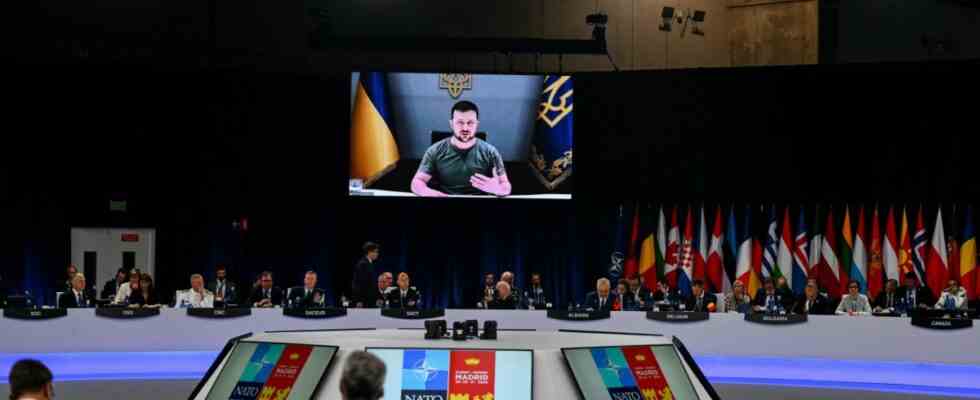These are probably the exact words that Volodymyr Zelenskiy wants to hear from the NATO summit in Madrid. “NATO’s best policy over the decades has been its open-door policy. It shouldn’t be changed,” says the president. This should be emphasized “especially for Ukraine” because “every nation must have the sovereign right to choose the foreign policy and security architecture in which it wants to participate”. As encouraging as they are, the sentences have a catch. They come from Stevo Pendarovski, the head of state of North Macedonia. It is the youngest NATO member. With two million inhabitants, it is also one of the smallest. Nobody from the weight class of Joe Biden, Emmanuel Macron or Olaf Scholz says anything remotely in Madrid. Even NATO Secretary General Jens Stoltenberg speaks only very generally of the fact that the alliance with the invitations to Finland and Sweden is demonstrating that “NATO’s door remains open.”
While welcoming Ukrainian President Volodymyr Zelenskiy, who was on the call, Stoltenberg praised “the bravery of the Ukrainian people and armed forces,” and of course he promised: “The NATO allies will continue to stand by Ukraine.” Apart from the words of the North Macedonian, there is hardly any talk of Ukraine’s future in NATO. No one is less surprised by this than Zelensky. During a visit shortly before the start of the war, Chancellor Scholz encouraged, if not urged, him to say goodbye to the NATO plans – which have been a constitutional goal in Ukraine since 2019. NATO’s open door might just be “a dream,” Zelenskiy said at a joint press conference.
You can’t start a war because of something “that isn’t on the agenda at all” and that no politician active today will experience anymore, Scholz then persuaded President Vladimir Putin in the Kremlin. Meanwhile, Scholz and the others in the NATO circle no longer have any doubts that the attack on Ukraine had long been decided at that point. With every day of the war, at least in the western NATO states, the conviction has become more firmly established that Ukraine’s admission will not be realistic for a long time to come.
Zelenskij is clear. “Is it a coincidence,” he asked the NATO heads of state and government in his speech, “that all the Allies in the East, all our neighbors, are in favor of Ukrainian NATO membership?” He gives the answer himself: “No, that’s no coincidence. It’s logical. That means understanding life in our region.” Then Selensky chooses the image of old turnstiles in the Kiev Metro, which close when a passenger approaches and only open again after money has been inserted. “Hasn’t Ukraine paid enough,” he asks, “is our contribution to the defense of Europe and the whole of civilization still insufficient? What else is needed?”.
It is a question to which Zelenskij from Madrid does not get an answer. The new strategic concept confirms a resolution from the 2008 NATO summit in Bucharest, according to which Ukraine and Georgia will become NATO members. Even then, however, it was decided, not least at the instigation of Chancellor Angela Merkel, without any practical effect and without any realistic prospects of accession. Strictly speaking, NATO is reaffirming a promise of no value. Zelensky knows that. “We need security guarantees. You have to find a place for Ukraine in the common security space,” he demands. It can be heard that even Zelensky no longer really sees the place in NATO. What is at stake now are the security guarantees.
At the G-7 summit there was talk of security commitments. What does that mean?
They will not be able to come from NATO, because the alliance only grants it to its own members. Consequently, such guarantees would have to come from individual states, above all from the group of G7, which at the summit in Elmau had declared their willingness to “agree with interested countries and institutions and Ukraine on long-term security commitments for the period after the war to help Ukraine defend itself, secure its free and democratic future and deter future Russian aggression”.
What that means in concrete terms has so far remained a mystery. And that’s where it’s supposed to stay for the time being, as Olaf Scholz indicated in Elmau with his tight-lipped “yes” to a journalist’s question as to whether he could specify the security guarantees. Such a “yes” can mean many things, for example that there are actually concrete plans that should remain secret. However, it is very unlikely that the countries in question have actually agreed in such detail. It is also striking that the declaration of the G 7 does not mention guarantees at all, but rather commitments. This could be continued arms deliveries and other aid, or an automatism to reinstate suspended sanctions against Russia in the event of aggression.
In any case, nobody in Madrid can foresee an end to the war. Chancellor Scholz promises that aid with money and weapons will continue “for as long and as intensively as is necessary for Ukraine to be able to defend itself”.

